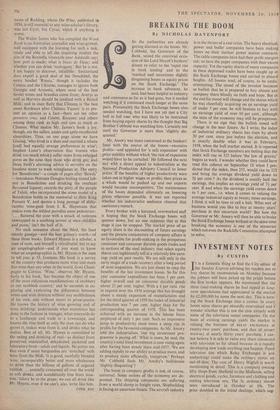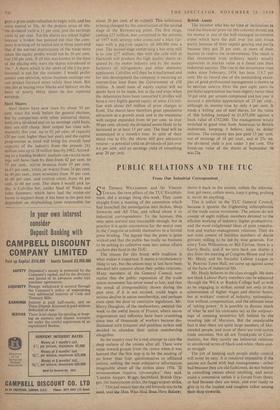INVESTMENT NOTES
By CUSTOS
IT is a fantastic thing to find the City editor of the Sunday Express advising his readers not to buy shares he recommends on Monday because
the jobbers will have jerked up the prices before the first broker appears. He mentioned that the
three road-making shares he had tipped as long-
term speculations had appreciated in the market by £2,000,000 by noon the next day. This is turn-
ing the Stock Exchange into a casino. In every boom some shares get absurdly overvalued and I wonder whether this is not the case already with some of the television rental companies. On the basis of existing earnings yields the market is valuing the business of RELAY EXCHANGES at twenty-two years' purchase, and that of , HENRY WIGFALL at nearly thirty years' purchase. I can- not believe it is safe to value any share connected with television so far ahead because in a rapidly developing new trade anything can happen. Piped television (on which Relay Exchanges is just embarking) could make the ordinary rental set out-of-date. The case of Henry Wigfall is worth mentioning in detail. This is a company owning fifty shops from Sheffield to the Midlands, selling electrical goods, cycles, furniture and clothing and renting television sets. The 5s. ordinary shares were introduced in October at 10s. The price doubled in the initial dealings, which sug- gests a gross undervaluation to begin with, and has since soared to 50s. At the present price of 48s. the dividend yield is 11 per cent. and the earnings yield 611 per cent. Yet the shares are talked higher because a broker has pointed out that the com- pany is writing off its rented sets in three years and that if the normal depreciation of the trade were taken the equity profits would not be 30 per cent. but 130 per cent. If all this was known at the time of the placing why were the shares introduced at 10s.? A share which is the sport of the City pro- fessional is not for the outsider. I would prefer maims AND SPENCER, whose business earnings one can project forward more safely than 'most. But one jibs at buying even Marks and Spencer on the basis of nearly thirty times its last reported earnings.
Steel Shares
Steel shares have now risen by about 50 per cent. since the week before the general election, but by comparison with other industrial shares, both on a dividend and on an earnings yield basis, they are still cheap. Steel output has risen sub- stantially this year, up to 92 per cent. of capacity (20 per cent. higher than last year), and the capital programmes in hand will bring the overall total capacity of the industry from the present 244 million tons up to 28 million tons by 1962. Accord- ing to a leading brokers' analysis COLVILLES earn- ings will have risen by then from 42 per cent, to 75 per cent., SOUTH DURHAM from 35 per cent. to 65 per cent., STEEL OF WALES from 24 per cent. to 40 per cent., JOHN SUMMERS from 39 per cent. to 60 per cent. and UNITED STEEL from 44 per cent. to 60 per cent. The share I would pick to- day is C'olvilles for, unlike Steel of Wales and John Summers, which have had the motor-car boom to support them, it has been in the past too dependent on shipbuilding (now responsible for
about 30 per cent. of its output). This imbalance is being changed by the construction of the second stage of the Ravenscraig plant. The first stage, costing £25 million, was completed in the autumn of 1957 with seventy coke ovens and a blast fur- nace with a pig-iron capacity of 400,000 tons a year. The second stage comprising a hot strip mill is to cost £57 million; this with the cold mill at Gartcosh will produce the high quality sheets re- quired by the motor industry and by the manu- facturers of refrigerators and other domestic appliances. Colvilles will then be transformed and for this development the company is receiving an interest-free loan from the Government of £50 million. A small issue of equity capital will no doubt have to be made, but in the end even when the debentures have been converted Colvilles will have a very highly geared equity of some £14 mil- lion with about £65 million of prior charges in front. The shares have therefore great speculative attraction as a growth stock and in the meantime with output expanded from 60 per cent. to over 90 per cent. already the dividend seems likely to be increased to at least 15 per cent. The final will be announced in a month's time. In spite, of their sharp rise to 65s. the shares still give attractive returns—a potential yield on dividends of just over 4.6 per cent. and an earnings yield of something over 20 per cent. British Assets The investor who has no time or inclination to read the financial press (or this column) should put his money in one of the well-managed investment trusts which have the pull over the unit trusts partly because of their capital gearing and partly because they put 20 per cent. or more of their income to-reserve for re-investment. The result is that investment trust ordinary stocks usually appreciate in market value at a faster rate than industrial equities. The rise in the investment trust index since February, 1958, has been 118.7 per cent. On its record one of the outstanding exam- ples of good professional management is shown to be BRITISH ASSETS. Over the past eight years its portfolio appreciation has been slightly better than 10 per cent. per annum compound and last year it secured a portfolio appreciation of 23 per cent., although its income Tose by only 4 per cent. It made a 'killing' out of steel shares, for the value of this holding jumped to £1,875,000 against a book value of £782,000. The management wisely switched in good time from American to British industrials, keeping, I believe, only its dollar utilities. The company has just paid 15 per cent. out of earnings of 18 per cent., and at 25s. 6d. the dividend yield is just under 3 per cent. The break-up value of the shares at September 30 was 23s.







































































 Previous page
Previous page